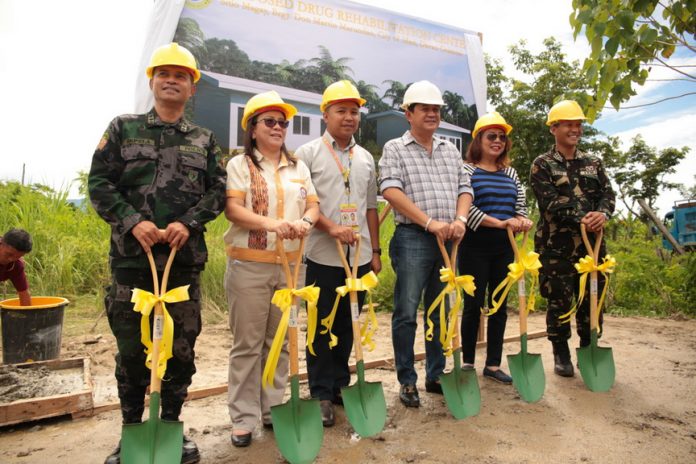
MATI CITY, DAVAO ORIENTAL – A new initiative to help treat drug reformists and to cut the cycle of drug addiction has started to materialize here as the Provincial Government and the Federation of Filipino-Chinese Chamber of Commerce and Industry, Inc. (FFCCCII) breaks ground on the province’s first Drug Rehabilitation Center.
Governor Nelson L. Dayanghirang led the facility’s historic groundbreaking ceremony on Friday, June 9 at the Provincial Government Compound in Sitio Magay, Barangay Don Martin Marundan in the City of Mati.
Based on the initial plan, the facility which is set to be completed within 40 days consists of two one-story buildings, separating male residents from the females. One of the buildings is being donated by the FFCCCII while the other is being funded by the Provincial Government. Upon completion of the first two buildings, a separate administration building is also set to be constructed to house the offices of the staff.
Provincial Consultant Cynthia Rodriguez, who represented the Filipino-Chinese group of businessmen, said she believes that the anti-drug efforts of the province will become a success because of its proactive role in forging partnerships with other institutions that have programs and resources that can contribute to achieve its goals in eradicating the drug menace here. “Hopefully this facility will significantly help the drug reformists redirect their lives,” said Rodriguez who also happens to be the Provincial Government’s bridge to the Filipino-Chinese group, making it possible for the province to tap the group’s financial support.
Davao Oriental is not new in terms of availing donations from the Filipino-Chinese group as it has previously donated fifteen school buildings across the province. “They were happy with the Provincial Government’s implementation of their programs,” she said, adding that it has helped build the group’s confidence to pour more funding to the province for yet another meaningful project touted to have a huge impact in the society.
Governor Dayanghirang expressed his gratitude to the Filipino-Chinese businessmen headed by its President Eduardo Bangayan for their support in the province’s thrust to fight the drug menace.
“It is our duty to uplift the welfare of the people that is why we prioritize the rehabilitation of the drug users through the construction of this residential treatment and rehabilitation facility which is a historic first in the province. It’s the answer to the great challenge posed by the illegal drug problem,” said Gov. Dayanghirang, stressing that with the huge number of drug reformists who have surrendered, the province has every reason to put up a rehabilitation center.
Aside from strengthening partnership with all stakeholders and the Provincial Government’s intensified efforts in the information campaign against illegal drugs, the Governor is sending a strong message to all stakeholders to mobilize all resources to help solve the most serious problem on illegal drugs. “I call on the police, barangay chairs and all those occupying seats of power in this campaign. Let us double our efforts. We shall not stop until the last drug lord, the last financer, the last pusher has surrendered and put behind bars. Let us do our job and I assure you my unwavering support in the fight against the illegal drugs trade,” he stressed.
Aside from supporting the thrust of President Rodrigo Duterte of fighting the drug menace, the drug rehabilitation facility is touted to have the potential to drastically curb drug addiction and break the crime cycle in the province.
As the Provincial Government is yet to plan for the operation of the facility, the Provincial Anti-Drug Abuse Council identifies the facility’s highlight services which include medical, psycho-social, educational and economic programs to drug reformists, among many others. Tucked away from the city’s center and with a spacious area for future expansion, the facility’s tranquil location makes it conducive for treatment. The presence of the 701st Brigade military camp nearby makes the facility more secure from threats. By Karen Lou Deloso/Photo by Eden Jhan Licayan






